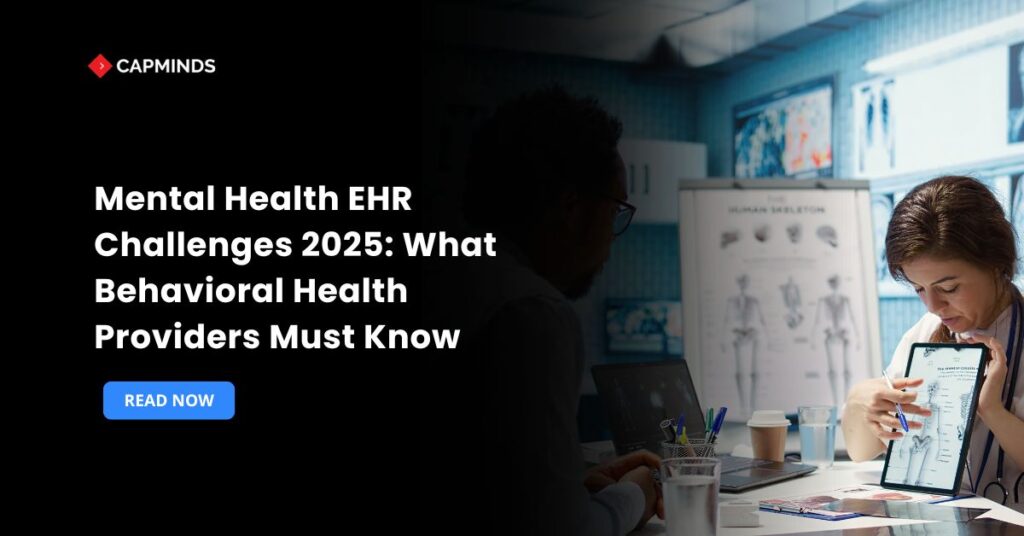Mental Health EHR Challenges 2025: What Behavioral Health Providers Must Know
The mental health sector has gradually adopted advanced digital tools to improve patient care, but EHR systems continue to pose certain challenges. While EHRs have altered healthcare in many ways, mental health providers confront unique challenges in 2025. Complex operations, sensitive data requirements, and an increasing desire for integrated digital services cause these issues.
In this blog, you’ll learn about the top challenges in mental health EHR systems, analyzing how they impact clinicians, patients, and healthcare organizations. It also emphasizes the importance of resolving these difficulties in enhancing behavioral health record management and developing patient-centered care systems.
Top 8 Challenges in Behavioral Health EHR
1. Mental Health EHR Adoption Complexities
The adoption rate of EHR in mental health is slower than in other specialties. The mental health providers have to record patient information like therapy notes, behavioral patterns, and long-term progress tracing. These records tend to be narrative by nature and, therefore, cannot be standardized in conventional EHR systems.
Systems are designed to compromise the primary care workflows, not behavioral health, and remain a challenge to many providers. In smaller practices and community clinics, the cost and training demands are a significant barrier.
Clinicians are still resistant to technology adoption because they are worried that the implementation of EHRs will disrupt the relationship between clinicians and patients.
2. Behavioral Health Records and Data Privacy
The most sensitive patient data are mental health records. Behavioral health necessitates additional protection because of the legal consequences that may be involved with psychiatric diagnoses and treatment backgrounds. Strict federal and state regulations, including 42 CFR Part 2, that regulate data of substance use treatment, are required.
Organizations are under pressure to protect mental health data against breach and unauthorized access. Healthcare systems are becoming more vulnerable to cyber attacks, and the reputational risk of data exposure is much higher.
Providers should have EHR tools that are highly encrypted, have access controls, and have audit trails to minimize patient and organizational threats.
3. Behavioral Health Systems Interoperability
Another issue is the interoperability of behavioral health systems. Mental health providers are often independent of hospitals or primary care settings, but their patients may often be under the care of a wide variety of providers.
In the absence of smooth interoperability, valuable information, such as medication lists, crisis interventions, or hospitalization records, may not be shared in time.
In 2025, interoperability problems remain despite the development of standards such as FHIR. Most behavioral health EHR vendors are yet to be fully compliant, which causes fragmented data.
This affects integrated care, where there are re-evaluations, drug errors, or does not address treatment plans. This barrier is essential in the process of delivering holistic and patient-centered care.
4. Integration of Behavioral Health With Telehealth
COVID-19 pushed towards the use of telehealth, particularly in mental health care. Patients expect remote therapy sessions, digital intake forms, and easy access to their providers online. But integration with telehealth to conduct behavioral health is not consistent across most EHR platforms.
With most EHRs, telehealth is an add-on and not an in-built feature. This poses a strain to the providers who have to interchange their systems, replicating documents and scheduling activities.
Poor integration impairs the continuity of behavioral health record management, which complicates outcome tracking of in-person and virtual visits. Service providers are also insisting on systems that can easily integrate telehealth with clinical processes.
Related: Custom EHR/EMR for Behavioral Health: A Complete Roadmap from Development to Implementation
5. User Experience and Clinical Burnout
Clinician burnout is one of the most commonly discussed healthcare issues today, and EHR usability has a big impact. Therapists rely heavily on rapport and communication; antiquated technologies with inadequate interfaces can be particularly troublesome.
Many mental health workers are still spending too much time navigating drop-down menus, filling out repeated fields, and maintaining alarms. This takes away significant time that could be spent with patients.
Poor user experience also reduces EHR adoption in mental health practices, as physicians see these systems as burdens rather than useful tools. Simplifying interfaces, automating repetitive operations, and providing voice-enabled documentation are essential steps toward reducing burnout.
6. Limited Customization for Behavioral Health Workflows
Mental health workflows differ greatly from those in other clinical settings. For example, therapists require long-form progress reports, psychiatrists require medication management tools, and case managers require community resource tracking. Unfortunately, many EHR systems don’t offer this level of customization.
Behavioral health doctors will continue to be dissatisfied with the restricted customization options. Without specific functionality, clinicians are forced to use workarounds or external tools, resulting in inefficiencies and data inconsistency.
Vendors who do not prioritize customized templates, outcome monitoring systems, and integrated screening evaluations risk losing relevance in the behavioral health sector.
7. Resource Limitations and Financial Barriers
Price remains a priority issue among mental health providers, particularly small ones and nonprofit-making organizations. There are the implementation fee, licensing, hardware, and training costs that tend to be beyond budget.
Most behavioral health organizations have tight margins, and large EHR investments are not easy to achieve, as in hospitals. Financial burden is not only during the initial stage of adoption. Continued expenditures on upgrades, support, and interoperability compound the issue.
Among providers of behavioral health in rural or underserved communities, poor IT infrastructure is an additional barrier to the adoption of EHR. Such financial constraints usually postpone the process of modernization, which keeps on creating inefficiencies in the care of the patients.
8. Mental Health Measures of Outcomes and Value
The outcomes of mental health care are more difficult to measure, unlike physical health care, where the lab results and imaging can be determined. Subjective assessments are needed to monitor mood or coping strategies, or the progress of therapy.
Even in 2025, EHR systems do not have standardized behavioral health outcome measures. This not only makes it difficult to monitor patient progress, but also makes the process of reimbursement process tied to the value-based care model difficult. The inability of EHRs to produce and record outcome-driven evidence is still a major impediment, as payers insist on it.
Transforming Care With CapMinds Mental Health EHR Services
At CapMinds, we understand the Mental health EHR challenges and help providers overcome them with solutions built for behavioral health. Our services are designed to simplify complex workflows, strengthen data security, and improve patient outcomes while reducing provider burden.
With our Behavioral Health EHR services, you gain access to technology that is fully aligned with your care delivery goals:
- Tailored Mental Health EHR Implementation – Built for therapy notes, treatment plans, and behavioral health documentation.
- Behavioral Health Record Management – Secure, compliant, and optimized for privacy regulations, including 42 CFR Part 2 and HIPAA.
- Interoperability Solutions – FHIR-driven data exchange to connect behavioral health systems with hospitals, labs, and pharmacies.
- User-Friendly Workflows – Reduce burnout with streamlined interfaces, automation, and customizable templates.
CapMinds empowers mental health organizations to move beyond EHR limitations and embrace a future of connected, patient-centered care.
Partner with us to build smarter, more resilient behavioral health systems.




